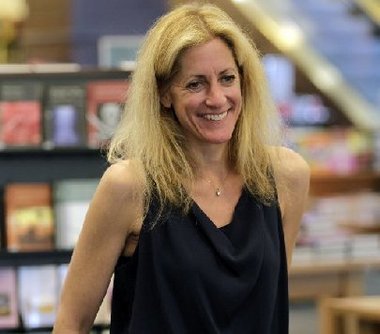‘Love at First Bark’ a great read with ties to New Orleans rescue community
By Sheila Stroup, The Times-Picayune, October 27, 2011 | Reprinted
When I heard that Julie Klam was coming to New Orleans, I wanted to meet her. First of all, she is hilarious. Her new book, “Love at First Bark: How Saving a Dog Can Sometimes Help You Save Yourself,” is laugh-out-loud funny, as well as being heartfelt and inspiring.

Photo: John McCusker / The Times-Picayune
It is called a “memoir,” but it is really an explanation of why Klam feels compelled to rescue dogs, especially Boston terriers, those little black and white pups with the big round eyes and pointy ears. It follows on the heels of her bestseller, “You Had Me at Woof: How Dogs Taught Me the Secret of Happiness.”
There is a moment in one of her stories when she decides she must foster — perhaps permanently — an adorable 3-year-old Boston terrier who has been described to her as “fecally-incontinent.” Because of her physical problems, the dog has been in and then out of several different places, and Klam feels sorry for her and fears she will never find a real home.
It is one thing to take in an adorable fecally-incontinent dog if you live in, say, a house with a doggie door and a fenced-in yard. Then it might seem almost doable. But Klam and her husband, Paul Leo, and their daughter Violet are living in a New York City apartment on the 16th floor and already have two young pups who can’t seem to get the knack of waiting to go until they’re outside. Still, she feels the need to help this little dog, and one evening at dinner she decides to break the news to Leo gently.
When she asks him if he’d like to know what she’s thinking about, he answers “No.” And when she asks him why, it’s because he already knows. “You’re thinking about the crapping dog, right?” he says.
Right. And the dog she names Clementine soon comes to live with them, with sometimes laughable and sometimes heartrending consequences. I met Klam Sunday when she was in town for a book-signing, and I told her I feel like we are kindred spirits. I wanted to know more about Leo. Being married to a man who has put up with my dog and donkey weaknesses for decades, I know she has a special husband. One of my favorite lines in “Love at First Bark” is this one: “If Paul and I died at the same moment — in some dog pee-related death, slipping in a puddle and cracking our heads open — and were buried together, the joint gravestone would read, “They never learned.”
The thing is, when you’re reading this book, it crosses your mind, just for a moment, that this could happen. Klam describes Leo, a TV producer, as not so much a rescuer as a willing bystander.
“I couldn’t do what I do if he wasn’t okay with it,” she says. “He allows the amount of chaos we have in our life.” Besides her family, rescuing dogs is what she loves most.
“There’s nothing else I fight to get,” she says. “I don’t care about things, but if a dog needs me, that’s what keeps me up at night.”
Leo becomes her partner in rescue more than once in the book. At a rather rocky time in their marriage, they find a gentle pit bull tied to a street sign on a New York City street and take it upon themselves to save him together. They name him Morris and discover he can sing. They also discover that the tops of his feet are covered with cigarette burns. Their adventure is a sweet and funny reminder that dogs rescue people while people are rescuing dogs.
The last story finds Klam and Leo joining in a wild dog chase during a four-day stay in New Orleans. Klam is friends with Ken Foster: writer, pit bull rescuer and founder of the Sula Foundation. Foster lived in New York before moving to New Orleans in July 2005. He still has rescue ties in Klam’s world, and she frequently contacts him for advice.
“Ken has a magnetic attraction to homeless dogs,” she says. In her book she describes him as someone who “could find a stray dog at the Lancome counter at Saks.”
Their visit in February was supposed to be a mini-vacation, but she also wanted to learn about animal rescue in New Orleans, and she asked Foster to take them to some shelters and introduce them to some rescuers.
“When you read about New Orleans, it doesn’t sound like any rescue you’ve ever seen,” she says. “Between Katrina and the Gulf Oil Spill, it seems like there’s a wildness about it.”
Foster introduced them to Charlotte Bass Lilly, director of Animal Rescue New Orleans (ARNO), the all-volunteer grassroots group that began after the storm and has become a permanent and much-needed fixture in the New Orleans area.
“At ARNO, it’s just an amazing number of people working long hours for no pay,” Klam says. “It’s a lot of people doing what they don’t have to do because they care.”
When she and Leo learn that a group of rescuers organized by ARNO plans to go to St. John Parish to catch a little dog with a pickle jar stuck on his head, they decide to join the posse.
“It was like the flip side of everything I’ve done in Manhattan,” Klam says. At home she might pull a Boston terrier from a shelter or pick up one from an owner who didn’t know what she was getting into when she brought home a dog.
“Sometimes, they come with a whole little suitcase of clothes,” she says.
The Saturday morning rescue, slogging through a swamp in LaPlace, is nothing like that. I don’t want to spoil the surprises, but you can watch a little intro to the story on YouTube. It is enough for me to tell you that the animal control officer, armed with a tranquilizer gun, asks Klam not to crouch down because her hair is the same color as the dog’s, and he doesn’t want to accidentally shoot her in the behind.
